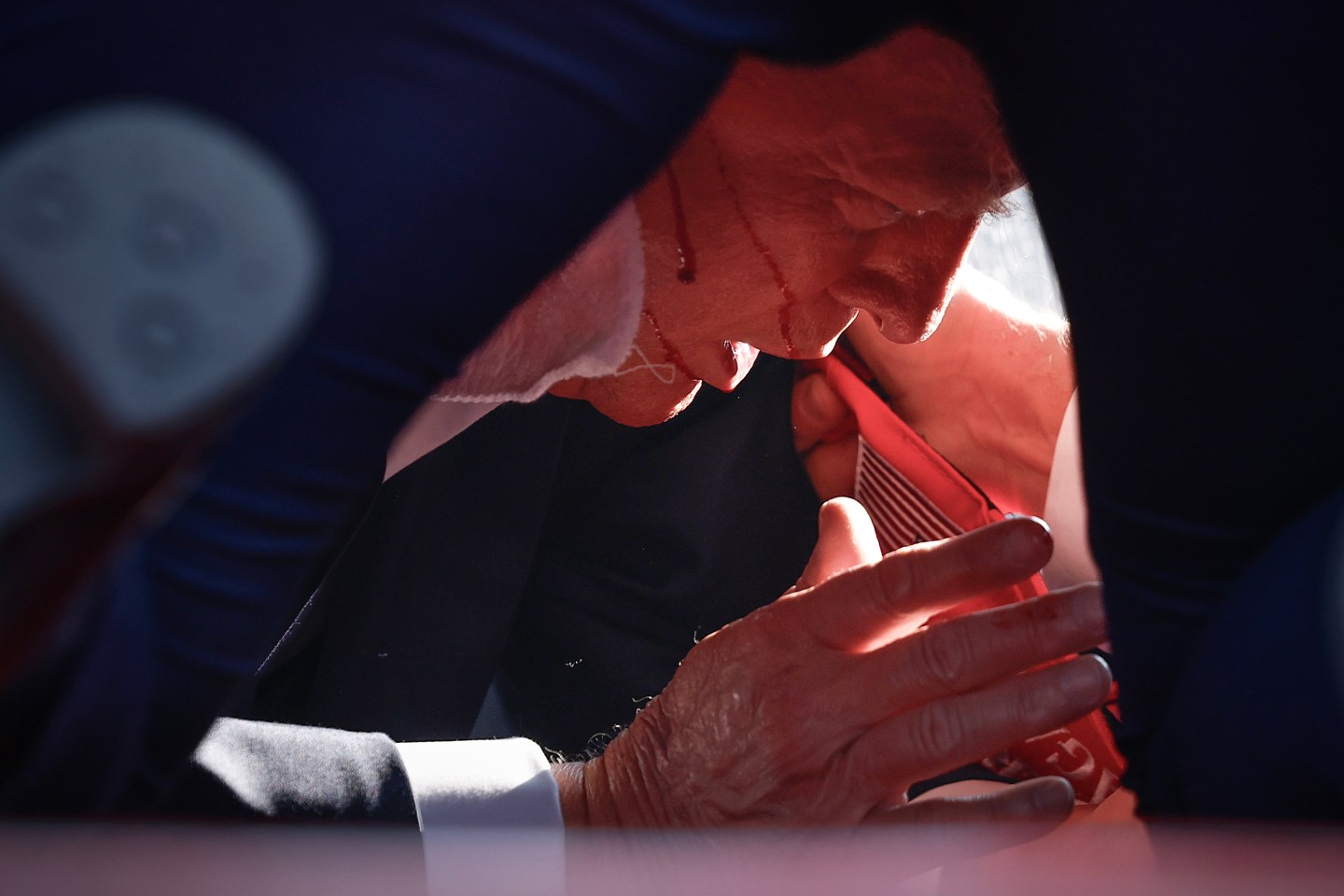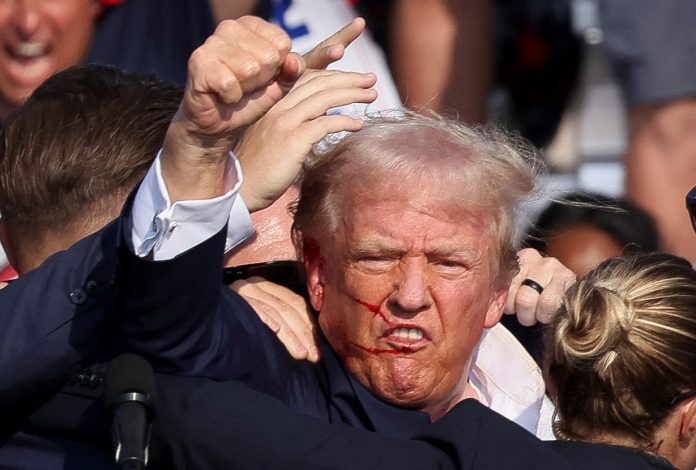The blight of political violence, seen again in the alleged attempt on former president Donald Trump’s life, is a peculiar stain on America, which is arguably the world’s oldest constitutional democracy.
By Chudi Okoye
The crowd was screaming “USA! USA! USA!,” with Donald Trump pumping his clenched fist in the air, his face contorted and what looked like blood trickling down from his right ear, as he was hustled off stage by Secret Service agents. Moments earlier, the former US president and presumptive Republican Party nominee for the Nov. 2024 presidential election had been crouched on the podium, protected, after a shooting incident at his campaign pass in Pennsylvania which appeared to have been an attempt on his life. The sniper, said to be one Thomas Matthew Crooks, a 20-year old registered Republican (thus a member of Trump’s party), had fired from a rooftop about 426ft (130 m) from Trump’s podium, in clear sight of the assembled crowd, and had apparently winged the top of the ex-president’s ear. Ouch!
It was remarkable how the gunman could have gotten so close to the venue without detection. An obvious security failure, now supposedly being investigated. Nevertheless, the shooter was reportedly killed by Secret Service in crossfire, though unfortunately there was another fatality and some folks in the crowd were also injured.
A picture of this scene framed by Donald Trump as he departed, complete with a US flag fluttering in the background, was priceless tableau vivant for the upcoming election.
Bloodied but unbowed!
Shaken, but not stirred!
Trump wanted to project an image of defiance (kudos to the eternal showman for quick thinking), and he worked his crowd to do the same before being bundled off the podium. Instinctive or affected, that imagery and the incident from which it sprang are a stain on American democracy.
Why is it that America, after more than two centuries of democratic practice, remains a noisy, chaotic and violent political culture – much unlike Europe, and increasingly like Africa and other places where Western-style democracy is only a relatively recent implant? Both France and the United Kingdom just called and concluded, in a matter of weeks, national elections that saw major changes in government: a weakened ruling party in France and expected exit of the current prime minister, due to a changed legislative pecking order resulting from the election; a complete change of governing party in the UK, after its own election. Consequential outcomes; yet, there was no report of political violence in either country.
But in America, the pageant of democracy is rarely without a violent tangent. From raucous campaigns to disputed results and electoral litigations to violent insurrection to assassination attempts: it is all there in the democratic action movie that is America.
Scholars trace rising political violence in America to varied factors such as a mental health crisis overrunning the country, as well as unfettered access to, and resultant ubiquity of, firearms – due to 2nd Amendment fetishism and the powerful gun lobby. Debate rages on the weight of these factors. But there’s consensus that a leading cause is incendiary rhetoric reflecting deep ideological and political polarization in the country.
Deep Polarization
When Comte de Tracy, the Enlightenment philosopher and French aristocrat, coined the term ‘ideology’ in 1796, in the era of revolutionary France, he could not have known what would become of his baby barely two centuries later. What he’d conceived of as a ‘science of ideas’, the abstract preoccupation of ideologists, evolved over the years to encompass a set of beliefs, values and principles that guides an individual’s or a group’s understanding of the world. This was supposed to be differentiated from the irrational impulses of the mob or the particularistic interests of partisans. However, far from such lofty notions, the concept has become, in our time, a cudgel in the palms of political partisans and ideologues. It has become a divisive factor no less pernicious than primitive ethnicisms in Africa and elsewhere often condescendingly theorized by smug Western ethnographers.
There’s no greater illustration of this than what obtains in America.
American politics is uniquely animated by ideological antagonism. This is not necessarily because mainstream tendencies in the major political parties, Republican and Democratic, are vastly differentiated. No. There is in fact something of a loose consensus at the centre of American politics. Rather, it is because the main parties are coalitions of differing tendencies, with centrist impulses pulled to the extremes of right and left on the ideological spectrum. The political space is bursting with energy, and political survival often requires catering to different ideological interests, including the radical extreme on either side.
The pulse of politics is all the more quickened because in America ideology intersects in intricate ways with deep social currents pertaining to race and ethnicity, religion, gender, sexuality, disability and class. That is, in America ideology is deeply intersected with identity. The intersectionality of ideology with overlapping social identities tends to render American politics particularly toxic and volatile, more so when ‘wedge issues’ (i.e., controversial and divisive issues) are involved.
Political praxis based on ideology is supposed to be rational, focusing on ideas and principles, universal values and goals; and it ought to dwell on issues and policies that have universal appeal. Its practitioners are also supposed to be flexible, willing to compromise on policy issues to make progress, especially in light of new information.
But this is hardly the case when ideology intersects with identity. In that case, for the most part ideology becomes corrupted, conscripted in service of parochial interests. Ideological beliefs are shaped in this case not by universal principles but by group or personal experiences and identities such as race, gender, sexual orientation, etc. Politics becomes mainly focused on maximizing parochial interests. Policy issues may be framed at a superficial level through an ideological lens, but at a deeper level they serve narrow interests. For this reason, ideology soon loses its universalizing effect and becomes a source of enduring political cleavages. Ideology imbues social identities with an intellectual justification, validating parochialism in a way which makes compromise difficult or even impossible. Ideology becomes theology, an immovable structure of belief serving specific rather than universal interests.
The result is extreme polarization, seen in the increasingly divisive language employed by politicians; in unbridled partisan rhetoric which fosters what theorists call ‘affective polarization’, referring to in-group positive feelings and sentiments as against intense out-group animosity. We see it too in political practice, in actual legislation and public policy – in the “allocation of values,” to leverage David Easton – which caters to particularistic interests, creating deep wells of discontent in the polity.
This, sadly, is the story of America, a supposedly enlightened democracy gradually succumbing to cultural degeneration. And Trump, a purveyor of divisive politics, has added greatly to this phenomenon.

Trump’s Political Persona
We should all be glad that Donald Trump survived the alleged attack on his life. But I hope it won’t sound too harsh in this febrile moment for me to say – invoking the metaphor of chickens coming home to roost – that the man had it coming. He has played a not insignificant part in the debasing and vulgarization of American politics. And what happened to him in the pastureland of Pennsylvania was a direct result of it.
His political persona, at once cartoonish and calculating, undermines America. His demagoguery and uncouth language infects and inflects the dynamics of politics. He makes vile and incendiary comments, targeting everybody high and low, from political opponents to ordinary citizens. Trump has to be among the world’s most foul-mouthed politicians, seemingly with no filter as he spews his stream of consciousness on social media or whilst out on the hustings. Most importantly, his policy pursuits, packaged for him by far-right ideologues using him to achieve their grand agenda of halting progressive change, bode ill for America.
I know this might sound jarring, especially with pundits and politicos at this moment crouching under the numbing weight of political correctness. I have read some of the bland editorials in mainstream newspapers. What I say here might sound somewhat impolitic, and maybe even brazen coming from a mere naturalized citizen translocated from previous nestlings in Europe and Africa. But, being here, I have a stake in what America makes of itself.
We should not allow this moment to turn into a political martyrization of Donald Trump. The man, being a ceaseless self-promoter, will want to make that happen. And it’s not just him. Trump boosterism syndrome, rabid in his circle before now, will hence likely swell way beyond his base. We should not let that happen. Pennsylvania was not Trump’s Damascus. Trump will be Trump, and he’ll maximize to the hilt any boost he secures from this incident, without in the slightest changing his political stripes.
Trump’s political opponents should allow space for a traumatized nation to recover. But they should not tarry too long in taking on the spectacular menace to American democracy that is Donald J. Trump.



